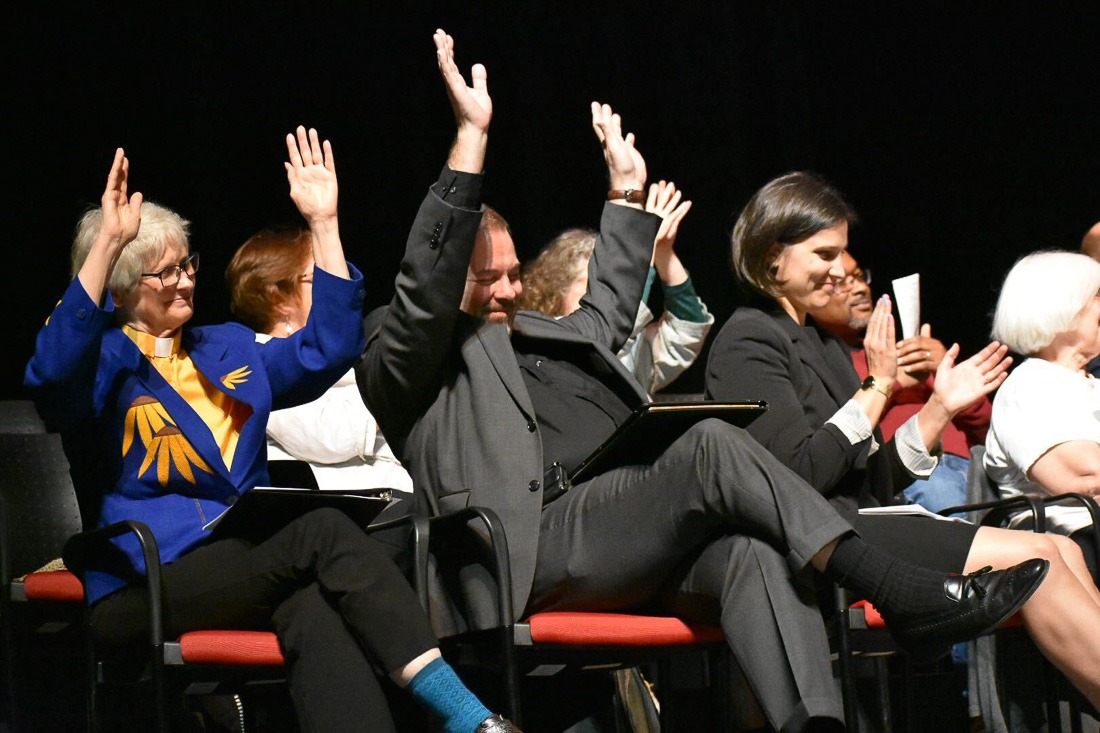By Cuyler Dunn, The Lawrence Times
Lawrence and Douglas County elected officials made pledges to support initiatives aimed at boosting the elder care workforce and abating chronic homelessness Sunday at the annual Justice Matters Action Assembly.
More than 500 members of Justice Matters, a nonprofit coalition of faith-based groups and neighborhood networks, joined local officials to express their support for specific justice-focused policy actions.
“We will plant seeds that will hold promise and hope for our community. Seeds that will grow to the kind of future we hope for,” said Ann Spangler, a Justice Matters member with First United Methodist Church, during the event’s opening statement.
“When I consider the issues we are tackling — the elder care workforce and ending chronic homelessness — they are immense,” she said. “It pains me to know that we have those in the Douglas County community without shelter and carrying everything they own on their persons. It also hurts me to see our elders fearful of where to go or if they will receive dignified care as they age.”
Justice Matters celebrated a handful of successes from last year’s assembly, including the rejection of a jail expansion and the opening of the Treatment & Recovery Center of Douglas County. They also cheered the training of Lawrence Public Schools staff in restorative practices.
This year, they continued pleas in two areas: increasing elder care and ending chronic homelessness.
Elder care workforce
Douglas County Commissioner Patrick Kelly affirmed his charge to continue working to increase the elder care workforce.
Justice Matters has for multiple years called for the implementation of a program called Dwyer Workforce Development to address staffing shortages in elder care. Dwyer Workforce Development provides financial aid and support to prospective certified nursing assistants, certified medical assistants and other senior health care professionals. The program started in Maryland and has expanded to Texas and Florida.
The plan would be implemented by the Heartland Workforce Development Board, a local nonprofit organization that provides workforce development.
Gina Coffman, executive director of Heartland Workforce Development, voiced support Sunday for the program. She said more than 35 long-term care facilities in Kansas have closed since 2020.
“This is just going to continue to increase, which we don’t want, if we don’t have initiatives, like Justice Matters passed with this elder care program, to support growing and making people aware of the opportunities available to help them,” Coffman said. “I think this is a great solution.”
Kelly echoed this sentiment, pledging support for a memorandum of understanding between Heartland Workforce Development and Dwyer Workforce Development.
Kelly is a board member representing Douglas County on the Heartland Works Chief Elected Officials Board. He pledged Sunday to urge implementation even in the face of opposition from other county representatives.
“It’s just been a really great partnership,” Kelly said. “We have a lot to celebrate when it comes to workforce development in this area.”
Ending chronic homelessness
Fellow Douglas County Commissioner Shannon Reid joined Lawrence City Commissioner Brad Finkeldei to pledge to support the “A Place for Everyone” strategic plan, which seeks to end chronic homelessness.
Wanda Haney, a Justice Matters member with the Grace Neighborhood Network, said the strategic plan and other initiatives like the city’s new Pallet shelter village were simply a start.
“It’s important to remember that the work is just beginning,” Haney said. “‘A Place for Everyone’ is a multiyear plan addressing the continuum of housing needs, which still needs to be approved and implemented.
“And most importantly, let us never forget the individuals behind the statistics: their faces, their stories and their hopes for the future,” Haney continued. “They are the reason we do what we do. And they must remain at the center of our efforts.”
Reid and Finkeldei both pledged to support the passage of the strategic plan, which will be on the city commission’s agenda May 7 and the county commission’s agenda May 8. The pair also pledged to support funding the plan in upcoming budgets.
“Thank you for having me and for always putting on this opportunity for folks to gather in community and make a shared commitment to collective action,” Reid said. “It’s a powerful thing to be a part of.”
Reid praised the work of people in Justice Matters who have personally worked with local organizations to support those experiencing homelessness. She said mutual action between the community and local government is crucial to ending chronic homelessness.
Although Reid and Kelly constitute a quorum of the Douglas County Commission, their attendance and advocacy at Sunday’s event is not a violation of Kansas open meetings laws because the event was noticed on the county website and they did not commit to support the same initiatives.
Finkeldei said one way the community can continue working with local representatives is supporting the new land development code that is a work in progress.
“Homelessness is a housing problem. It’s all about housing,” he said. “This is a plan that will allow us to increase density, to allow us to increase housing, allow us to build housing.”
He encouraged people to think not only about how the code might affect them, but also their neighbors and those most vulnerable in the community. That is a posture that speakers from Justice Matters echoed Sunday.
“Justice is wide-reaching because it requires a system change that impacts everyone,” said Ted Mosher, a Justice Matters member and pastor at Good Shepherd Lutheran Church.
“Look around you at the people who have come to support and encourage progress for justice. By coming together as a community, this is how we live out this justice calling.”
View the original story here.






